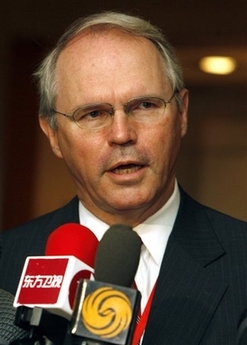N.Korea talks end without deadline
(AP)Updated: 2007-07-20 13:32
Earlier, the United States insisted Friday that North Korea could disable its nuclear facilities by the end of the year, even though negotiators have been unable to get a firm commitment from Pyongyang to do so.
 US Assistant Secretary of State Christopher Hill speaks to journalists at a hotel in Beijing, China, Thursday, July 19, 2007. [AP]  |
US Assistant Secretary of State Christopher Hill entered the six-nation talks this week saying he hoped to get a commitment from the North to declare its nuclear programs and disable them by year's end - rendering the communist nation unable to easily make more bombs.
But as the last day of talks began Friday, he said the sides have only agreed to have working groups of experts pore over technical details for those next steps before the top envoys from all sides endorse a timeframe. The working groups likely will meet by the end of August, he said.
"Ultimately, we decided not to put in deadlines - yet," Hill said. "We'll put in deadlines when we have the working groups and we know precisely what we're talking about."
Still, Hill said he believed North Korea could complete disabling its nuclear facilities by a year-end deadline.
"My opinion remains the same that all of this is quite doable by the end of the year," he said.
White House spokesman Tony Snow said "there will be continued diplomacy."
"The North Koreans understand that they need to finish the job not only of shutting down the Yongbyon reactor, but also making sure that they put an end to the reprocessing or enrichment of uranium or other fissile materials," he said.
The country missed an April deadline for shutting down its reactor by three months due to a separate banking dispute that Washington had pledged to resolve.
The reactor shutdown Saturday was the first step North Korea has taken to scale back its nuclear ambitions since the crisis began in late 2002, when a 1994 disarmament deal fell apart and the North reactivated its reactor.
The talks - including China, Japan, Russia, the US and the two Koreas - had been scheduled to end Thursday, but Hill said they were being extended a day for the sides to meet with China's foreign minister Friday before the Chinese hosts issue a statement summing up the session.
On Thursday, Hill denied that North Korea was seeking to drag out the process with new demands, and said this session of the talks was the "very best" as it remained focused on future moves.
South Korea also sought to put a positive spin on the meeting.
"The biggest achievement of this round of talks is that North Korea clearly stated its position that it has no intention of dragging its feet in carrying out its obligations," Seoul's envoy Chun Yung-woo said Friday.
All six countries' foreign ministers are also to hold a meeting, which Hill said would likely be set in September.
North Korea has begun receiving 50,000 tons of oil from South Korea as a reward for the shutdown, and is to eventually receive the equivalent of a total of 1 million tons for disabling its nuclear facilities under a February agreement among the six countries.
However, the North only has the capacity to receive 50,000 tons a month, meaning the US and its partners are seeking to offer other forms of energy-related aid to keep the process from dragging out for deliveries that would take another 19 months.
By eventually disabling its nuclear facilities, North Korea would lose its ability to easily make more atomic bombs - going beyond achievements at any previous arms negotiations with Pyongyang. The North conducted an underground nuclear test in October, confirming it could build a weapon.
In a blow to the disarmament process, North Korea slammed Japan for raising at the six-nation talks the issue of Japanese citizens that the nation has admitted to abducting - warning that it could pose "another crisis" in the negotiations.
If Japan continues to refuse to participate in aid being offered for North Korea's disarmament, "the nuclear issue on the peninsula will remain unsettled for an indefinite period," the North's Foreign Ministry said in a memorandum carried by the official Korean Central News Agency.
The North's angry statement on the abduction issue came hours after a brief one-on-one meeting between the North Korean and Japanese envoys.
On Friday, Japanese envoy Kenichiro Sasae express disappointment with latest round of six-nation talks.
"It is impossible to be satisfied with North Korean actions," he said.
In 2002, North Korean leader Kim Jong Il admitted 13 Japanese were kidnapped to help train spies. Five were released and Pyongyang said the others died, insisting the issue was settled.
But Japan remains skeptical, and the issue has assumed central importance in the government of Prime Minister Shinzo Abe.
 | 1 | 2 |
|
|
|
||
|
||
|
|